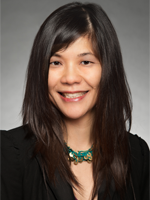Approximately 200 health care professionals, including physicians, nurses, therapists, case managers, social workers and psychologists, attended the 1st MD Anderson Cancer Center and TIRR Memorial Hermann Cancer Rehabilitation Symposium, held May 13-14 at The University of Texas MD Anderson Cancer Center in Houston. The symposium focused on “Shifting Paradigms in Cancer Rehabilitation.”
 More than 14 million people are cancer survivors in the United States, a number expected to rise to almost 19 million by the year 2024. “Because cancer survivors often experience complications from cancer and treatment that can impact function, cancer rehabilitation plays an important role in the cancer care continuum,” says Anna de Joya, PT, D.Sc., NCS, director of new program development for Memorial Hermann Post Acute Care Services, program manager of Specialty Rehabilitation at TIRR Memorial Hermann and co-planner of the symposium. “The symposium focused on the benefits of rehabilitation for various cancer diagnoses and treatments that impact quality of life, with a special focus on evidence-based assessment and treatment strategies that can be applied to clinical practice.”
More than 14 million people are cancer survivors in the United States, a number expected to rise to almost 19 million by the year 2024. “Because cancer survivors often experience complications from cancer and treatment that can impact function, cancer rehabilitation plays an important role in the cancer care continuum,” says Anna de Joya, PT, D.Sc., NCS, director of new program development for Memorial Hermann Post Acute Care Services, program manager of Specialty Rehabilitation at TIRR Memorial Hermann and co-planner of the symposium. “The symposium focused on the benefits of rehabilitation for various cancer diagnoses and treatments that impact quality of life, with a special focus on evidence-based assessment and treatment strategies that can be applied to clinical practice.”
With the aging population and extended survivorship, physicians and other health care providers expect the demand for cancer rehabilitation to grow dramatically. “Cancer rehabilitation has existed as a subspecialty for many years but has only recently moved into an important position within the discipline,” says Ying Guo, MD, an associate professor in the department of Palliative Care, Rehabilitation Medicine and Integrative Medicine at The University of Texas MD Anderson Cancer Center and co-planner of the symposium. “In general, patients under treatment for cancer have fluctuating symptoms and more dramatic changes in their medical condition than patients undergoing rehabilitation for stroke, traumatic brain injury and other conditions. While more physicians and therapists are paying attention to the issues surrounding survivorship, experience and knowledge are lacking in the health care community. This is the right time to share the knowledge we’ve gained over the last 20 years with other providers.”
 Featured speakers at the symposium were Julie K. Silver, MD, associate professor and associate chair for strategic initiatives in the department of Physical Medicine and Rehabilitation at Harvard Medical School; Ron J. Karni, M.D, chief of the division of Head and Neck Surgical Oncology and an assistant professor with joint appointments in the department of Otorhinolaryngology-Head and Neck Surgery and the division of Medical Oncology at McGovern Medical School at UTHealth; Jack Fu, MD, a physiatrist and associate professor in the department of Palliative Care, Rehabilitation Medicine and Integrative Medicine, division of Cancer Medicine, The University of Texas MD Anderson Cancer Center; Carolina Gutiérrez, MD, a physiatrist specializing in cancer rehabilitation at TIRR Memorial Hermann and clinical assistant professor in the department of Physical Medicine and Rehabilitation at McGovern Medical School at UTHealth; and Samantha Dewey, PT, DPT, NCS, a physical therapist and board-certified Neurological Certified Specialist at TIRR Memorial Hermann.
Featured speakers at the symposium were Julie K. Silver, MD, associate professor and associate chair for strategic initiatives in the department of Physical Medicine and Rehabilitation at Harvard Medical School; Ron J. Karni, M.D, chief of the division of Head and Neck Surgical Oncology and an assistant professor with joint appointments in the department of Otorhinolaryngology-Head and Neck Surgery and the division of Medical Oncology at McGovern Medical School at UTHealth; Jack Fu, MD, a physiatrist and associate professor in the department of Palliative Care, Rehabilitation Medicine and Integrative Medicine, division of Cancer Medicine, The University of Texas MD Anderson Cancer Center; Carolina Gutiérrez, MD, a physiatrist specializing in cancer rehabilitation at TIRR Memorial Hermann and clinical assistant professor in the department of Physical Medicine and Rehabilitation at McGovern Medical School at UTHealth; and Samantha Dewey, PT, DPT, NCS, a physical therapist and board-certified Neurological Certified Specialist at TIRR Memorial Hermann.

